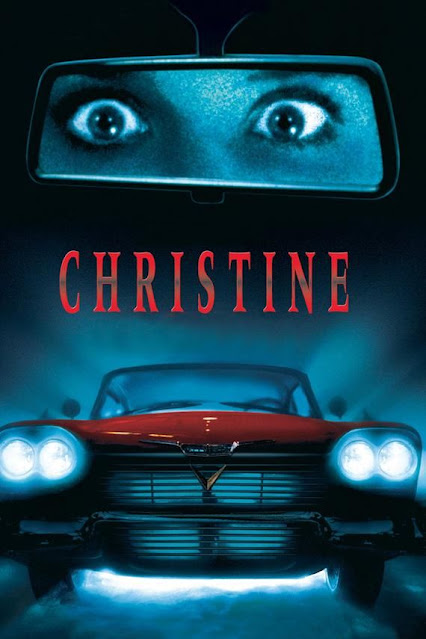Like any 21-year-old in 1978, Christine is obsessed with rock’n’roll. She is also looking for love.
The ‘57 Plymouth Fury has its headlights set on nerdy teen Arnie Cunningham (Keith Gordon).
And there is nothing he or his friends (John Stockwell, Alexandra Paul) can do about it.
I am a big fan of John Carpenter’s work, but this was one of the few of his flicks I have not seen. Ironically, it is also the only Stephen King book I have read.
Christine is not a great Carpenter movie, but Christine herself is top tier.
Whereas the novel complicates its villain by including the spirit of its former owner, the cinematic Christine is a pure Carpenter antagonist.
From the opening scene, in which she is introduced on the assembly line, to the strains of George Thorogood’s ‘Bad to the Bone’, we are left in doubt that Christine was bad from the beginning.
While the movie is pretty earnest, that initial song selection establishes the fine layer of irony that gives Christine (and the movie) a little more life.
A lot of this is down to the music. Carpenter is a filmmaker defined by his music, and while his score is fine, the movie comes alive in the selection of rock songs used to provide Christine’s ‘voice’.
The songlist is a list of tracks from Christine’s era of manufacture, and help to give the car her vindictive, darkly mordant personality (Little Richard’s "Keep A-Knockin'" plays when an uninvited guest tries to open the door).
While the idea was later borrowed by the Transformers films, the use of songs for Christine feel more incisive in communicating her emotions, and her fixation on her new owner.
The scene where Christine reassembles herself to the tune of the Viscounts’ version of ‘Harlem Nocturne’ almost feels like a seduction, as she finally reveals herself to Arnie.
While the story could be seen as a metaphor for puberty and sexuality, or America’s obsession with cars, or a dark rebuke to eighties America’s obsession with the fifties, Christine is not really about anything more than what it says on the tin.
It is handsomely produced, and feels of a piece with John Carpenter’s other films from this period, but it never rises above merely watchable.
As far as the performances, Keith Gordon is excellent as Arnie Cunningham. He manages the transformation from nervy wallflower to obsessed loner, although the film never really figures out the resolution in a particularly satisfying way. Arnie becomes Christine’s and becomes a side player during the third act, as his friends fight to destroy Christine.
Stockwell and Paul are fine as, respectfully, Arnie’s best friend Dennis and prospective love interest Leigh. As already stated, these characters are bystanders to Arnie’s downfall, and only become active in the climax. In the book, Dennis is the narrator of Arnie’s story, and that inner monologue gives more context and depth to the characters’ relationships. While the actors have a good rapport, the movie lacks the same sense of character investment.
Overall, Christine is elevated by the execution of its title character, but otherwise it is just solid.

No comments:
Post a Comment